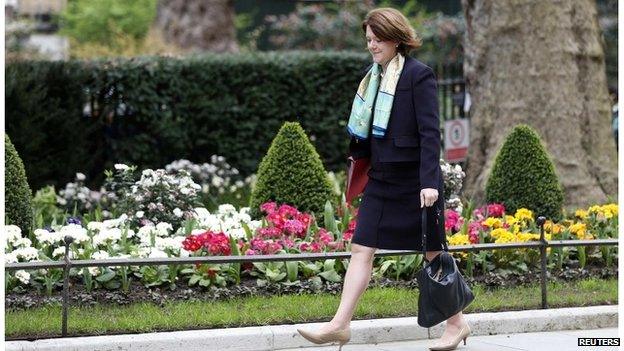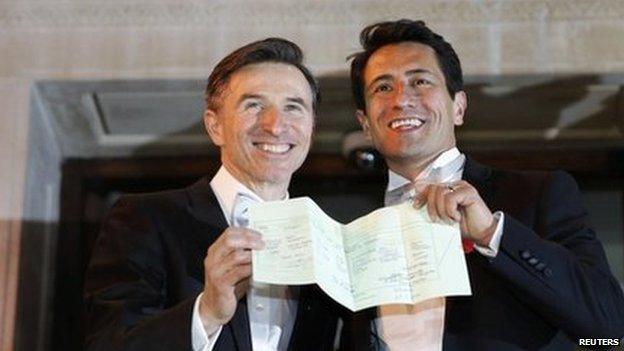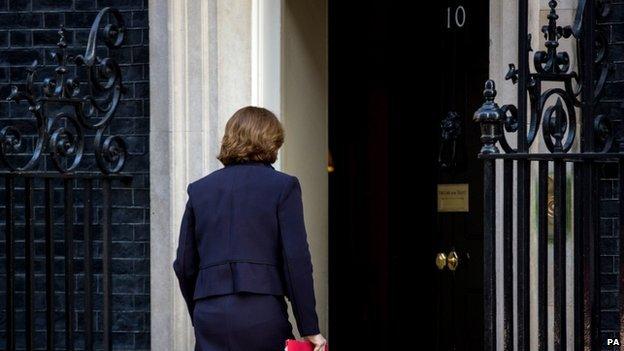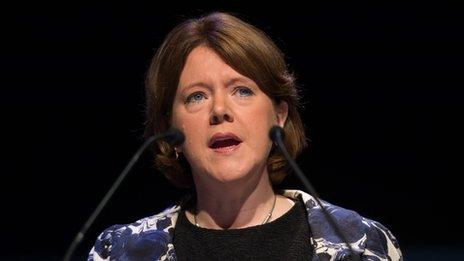Profile: Maria Miller
- Published

Maria Miller was one of only four women in the cabinet
Maria Miller, who has resigned as culture secretary, was one of the less well known members of David Cameron's cabinet until just under a week ago.
How she must be pining for those days.
The 50-year-old mother of three came under intolerable pressure to go after she was forced to apologise to the House of Commons for over-claiming mortgage costs - and for her attitude towards the inquiry into them.
Her 32-second statement to MPs was at best perfunctory, at worst arrogant and insulting, her critics argued.
The newspapers hammered away and - although Mr Cameron stood by her - Conservative colleagues were beginning to publicly question the effect she was having on the party's standing with voters, with difficult European and local elections coming up.
In the end it proved too much and she resigned.
Gay marriage
The controversy surrounding Mrs Miller was out of keeping with what had been, before she joined the cabinet in 2012, a relatively low-profile career in Westminster.
The comprehensive school-educated former advertising executive had gained a reputation for being an efficient, unflamboyant operator.

Mrs Miller was roundly criticised by the press
After becoming MP for Basingstoke in 2005, the LSE graduate and former teenage Conservative activist was quickly given a frontbench job by the new party leader David Cameron.
She served as shadow families minister in opposition and was given the role of minister for disabled people in the Department of Work and Pensions when the coalition came to power in 2010.
Her appointment as culture secretary and as minister for women and equalities was something of a surprise because Mrs Miller, who grew up and was educated in Bridgend, had been widely tipped to become Welsh secretary.
Press regulation
She inherited responsibility for two of the most controversial issues of the day: regulation of the press in the wake of the phone-hacking scandal and plans to legalise gay marriage.
She was closely associated with the new Royal Charter on newspaper regulation - backed by all the main political parties in the wake of the Leveson Inquiry into press standards, but resisted by large sections of the press.

Mrs Miller helped pilot gay marriage legislation through Parliament
Although much of the day-to-day work on the legislation was done by Cabinet Office minister Oliver Letwin, Mrs Miller was the public face of the changes and became a bogey figure for Fleet Street.
The fact that she had few allies in the press became evident after the Daily Telegraph published a story in December 2012 claiming Mrs Miller had claimed more than £90,000 in parliamentary expenses for the mortgage and upkeep of a house in south London between 2005 and 2009.
Labour MP John Mann also pursued the case relentlessly.
The claims, which became the subject of an inquiry by the parliamentary watchdog, were under the old system of second home allowances axed in 2010 following revelations about inappropriate claims by other MPs.

Mrs Miller continued to receive the support of the prime minister
The story highlighted Mrs Miller's domestic arrangements and the fact that she shared the house with her parents as well as her husband, a successful lawyer, and their three children.
In the course of the inquiry, Mrs Miller explained that her parents had played a key role in looking after her young children as she was combining her day job as a director of a large advertising firm with trying to get elected to Parliament - she unsuccessfully stood as a candidate in 2001.
In later years, the culture secretary began to assume caring responsibilities for her parents.
Her father John was dragged into the dispute over her expenses after No 10 claimed that he had been "doorstepped" and harassed by reporters on the Telegraph - claims disputed by the newspaper itself.
The subsequent probe cleared Mrs Miller of making false expenses claims, but said her submission of "incomplete" evidence to the inquiry had breached the MPs' code of conduct.
Mrs Miller was one of only four women in the cabinet and, as minister for women and equalities, she said she supported the reduction of the legal limit for abortions from 24 weeks to 20.
'Distraction'
The Telegraph and other newspapers continued to pursue her after her rather perfunctory apology to Parliament and former Conservative chairman Lord Tebbit said she was "arrogant" and should resign.
As the pressure to resign grew, several Tory MPs publicly questioned the effect she was having on the party, but Mr Cameron continued to offer her his public backing.
Mrs Miller and her friends launched an attempt at a fight back, with her parliamentary aide claiming she had been the victim of a media "witch-hunt".
But it was all too late. Mrs Miller accepted what had looked increasingly inevitable and gave up, saying in her letter of resignation that she did not want to be a "distraction".
Mr Cameron said he hoped she would return to the cabinet "in due course".
With Labour keen to make the story one about the prime minister's judgement in backing the former culture secretary, Mrs Miller is unlikely to fade from the news just yet, whatever her wishes.
- Published9 April 2014
- Published5 April 2014

- Published4 April 2014
